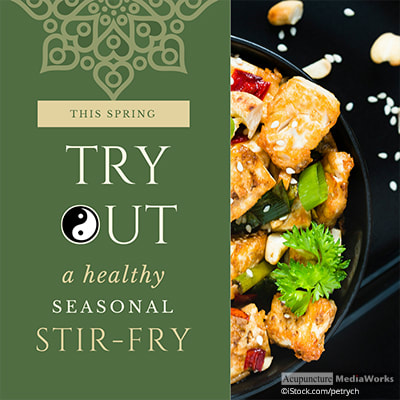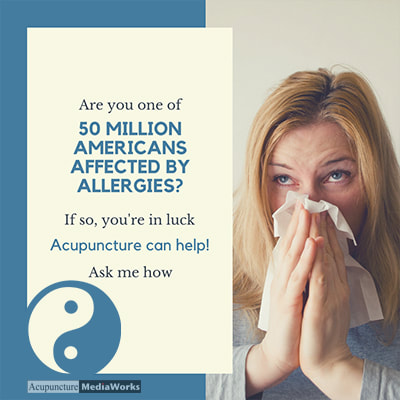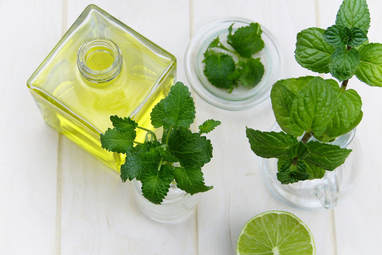 If you are looking to spice up your family meal this spring, why not try a healthy chicken stir fry. A meal that is colorful, warm, seasonal and easy to make. In Traditional Chinese medicine and Five Element theory, food is medicine. Not only is food healthy and nutritious biochemically, but it also has properties in temperature, taste, color and shape that benefit specific organs. Colors and taste benefit certain organs, for example, sour and the color green go to the liver. Pungent flavors such as garlic, ginger and onions benefit the lungs. Dark and salty foods like seaweed benefit the kidneys. The best thing to remember is to eat fruits and vegetables that are in season and try to add color to your food to encourage the healthy actions the organs have in the body. Warm and cooked vegetables are easier on the digestion than cold and raw food. A terrific item to add to the cooking schedule is a colorful and tasty stir-fry. A stir-fry has a healthy variety of colors, vegetables, meat, spices and seasoning. Typically what goes into a stir-fry includes chicken, soy sauce, oyster sauce, rice vinegar, honey, garlic, ginger, onion and rice. Preparation is simple and you can find countless recipes by conducting an Internet search. Typically, a recipe will look like this:
Marinating the chicken overnight adds richer flavor, if you so choose. Combine cornstarch, soy and oyster sauce, rice vinegar, honey and garlic. Stir fry in chicken until brown, set aside. Add vegetables and cook until crisp. Stir in chicken, add onion, peanuts or other things to taste. Serve over rice. For vegetarians, replacing tofu for chicken works as a delicious alternative. Play with some variety throughout the seasons. In the spring, opt for green foods to benefit the liver and gallbladder. In the summer, cool celery and basil might be soothing on a hot day. Autumn flavors might include leeks and white mushrooms to benefit the lungs. For winter, beef could be an alternative to chicken, as beef is warmer. As you can see, a nice stir-fry with a variety of seasonal vegetables just might be a great and healthy way to exercise the notion that “food is medicine” to your diet.  Traditional Chinese medicine looks at the human body quite differently than Western medicine. In TCM, there are energetic pathways associated with specific organs in the body. When these pathways or meridians, and the energy flowing through them, are out of balance, the body may become diseased. In TCM, the liver and its corresponding meridian are responsible for the smooth flow of Qi (pronounced “chee”) or energy, blood and emotions. The liver is easily affected by excess stress and uncontrolled emotions. Anger is the emotion commonly associated with the liver and gallbladder. If a person is frequently irritable, gets angered easily, has difficulty relaxing or letting things go, and is unreasonable, it is safe to guess their liver Qi isn’t functioning properly. Acupuncture for Liver Problems: In TCM, the liver has multiple functions. The liver is responsible for the movement of Qi throughout the body. When the Qi becomes blocked or stagnant, then disease can occur. Regarding the liver, this can manifest as anger, irritability, frustration, eye problems, tendon tightness, menstrual issues or even things like cirrhosis. Liver imbalances are one of the most commonly treated issues in TCM. Almost everybody has some degree of liver imbalance. Acupuncture is very good for releasing emotions, decreasing stress and eliminating pain associated with liver imbalances. TCM can bring the body back into balance by improving circulation and increasing blood flow to areas that may need the extra nutrients carried by bodily fluids. Acupuncture Points for the Liver:
Chinese Herbs and Formulas for the Liver: Another integral part of TCM is the use of herbs and herbal formulas. Many times the herbs can be used alone, but there will be a more synergistic effect when the single herbs are combined to make a formula. One such herb is the chrysanthemum flower, also known as Ju Hua, which clears liver heat. Lycium fruit, also known a Gou Qi Zi, enriches the liver to help with tendon and blood issues. Then there is a formula known as Da Bu Gan Wan. This formula is commonly called the liver nutrition formula. It can help with everything from hepatitis to general liver Qi stagnation. Dietary Recommendations for the Liver: Nutrition is also very important for proper liver function. Starting the day with fresh squeezed lemon juice in a glass of warm water will help decongest the liver and flush out toxins. Beets are good for cleansing the liver and tonifying the blood of the liver. Foods like ginger, peaches, scallions and garlic are good additions to the diet of anybody who is exhibiting signs of liver Qi stagnation because they move and regulate liver Qi. Seeking help from a locally licensed acupuncturist is a great way to take care of your liver. A TCM practitioner can guide you along the path to wellness and they can also work cooperatively with your doctor to give you the best chance of success for strengthening your liver or helping it heal.  The American Journal of Rhinology and Allergy published research that found acupuncture effective for the treatment of allergic rhinitis. Allergic rhinitis is also known as hay fever. The researchers compiled the results from 13 quality studies, which followed 2,365 participants. The various studies confirmed acupuncture significantly lowers the antibody known as immunoglobulin E or IgE. IgE is the antibody associated with allergies and hypersensitivities. The researchers found not only was the IgE antibody lowered, but so too were the symptoms associated with allergic rhinitis. The participants also reported better quality of life. Acupuncture and Traditional Chinese Medicine offer a permanent solution to seasonal allergies with an all-natural approach that will ultimately save you money. Since TCM attacks allergies in a much different method than Western medicine, there is a good chance your allergies will cease to be a problem. Western medicine knows how allergies work and what happens to the body, but there is still no explanation as to why. TCM doesn’t need to know why, this is because TCM looks at the body as a whole and uses an elemental system to determine where there are excesses and deficiencies in each person. So the TCM treatments are completely customized to each patient, thus making them much more effective than over-the-counter medications. When using TCM to treat allergies, practitioners focus heavily on something called Wei Qi. Wei Qi is similar to the immune system in Western medicine. Wei Qi protects the body against foreign materials that can lead to inflammation and eventually allergies. People with lower immunity/Wei Qi are more susceptible to allergies and frequent colds. Acupuncture helps to boost the Wei Qi making it more difficult for allergens to attack the body. Acupuncture by itself will make a difference in fighting allergies, but adding herbs and herbal formulas will provide the final punch to help eliminate allergies for good. Because each patient has different causes for their allergies, adding herbal formulas can greatly increase the efficacy of the acupuncture treatments by extending the effect of the needles. For example, if a patient specifically gets itchy, watery eyes when their allergies flare up, then the practitioner would likely want to draw the excess energy/element down. In this particular case, the patient would have an excess of fire creating wind. The practitioner would use acupuncture points known to decrease fire and wind in the body. Also adding herbs that do the same thing, would create a one-two punch type of treatment that has longer lasting, more permanent effects. Ultimately what acupuncture does is boost the Wei Qi/immune system while decreasing the inflammatory response in your body that occurs when an allergen is encountered. The other aspect of treatment, as stated earlier, is to look at the patient as a whole versus just the symptoms. A good acupuncturist will also focus on dietary habits that may be contributing to your allergies. Many times a person’s Wei Qi is depleted from within due to the foods they are eating. Things like sugar and dairy are often associated with a lower immune system. Eliminating or drastically reducing these items will allow the body to recover more quickly, making allergy attacks easier to resolve. A comprehensive plan that includes acupuncture treatments, herbs and dietary changes will yield the best results when it comes to fighting allergies.  An allergy occurs when your immune system reacts to a foreign substance, called an allergen. This could be anything from something you inhale to something you touch to something you eat. An allergic reaction may cause sneezing, coughing, watery eyes, a running nose, a sore throat and rashes. In severe cases, allergic reactions can induce something known as anaphylactic shock, which can actually be deadly. According to the Asthma and Allergy Foundation of America, nearly 50 million Americans are affected by nasal allergies. These numbers are increasing too. To date, allergies are the sixth-leading cause of chronic illness in the United States. Anaphylactic reactions are typically triggered by medications, food and insect stings, with pharmaceuticals causing the most allergy-related deaths. The cost of allergies exceeds $18 billion per year! There are ways to deal with allergies though. Obviously with life-threatening allergies, a person needs to know what they are allergic to and be very adamant about avoiding those substances. For others who deal with seasonal allergies, things aren’t as dire and the inconvenience of allergies can be navigated using many natural remedies, including Traditional Chinese Medicine (TCM). TCM is a medical system that has been around for thousands of years. The general theory behind TCM is to treat the patient holistically, taking into account all aspects of the patient’s illness. TCM utilizes many modalities to treat the patient, including acupuncture, acupressure, herbs, formulas, cupping and nutrition. For treating allergies, there are some wonderful herbs and formulas that can be implemented. Here’s a short list of items that can be used to treat non-life-threatening allergies. 1. Reishi or Medicinal Mushrooms: Medicinal mushrooms have been used for centuries to help with everything from balancing blood sugar to decreasing inflammation. But they are also well-known for their immune-boosting properties. Reishi mushrooms are adaptogenic and they help regulate stress in the body. This is great for allergy sufferers because allergies can be exacerbated by stress. 2. Scutellaria or Huang Qin: This herb is frequently used to treat acute respiratory infections and bronchitis. Two key components of Huang Qin are particularly good at relieving allergic asthma attacks. 3. Saposhnikovia or Fang Feng: Fang Feng is used frequently by TCM practitioners to expel and prevent wind pathogen invasions. So for allergies that prompt headaches and nasal symptoms, this is a great herb to have on hand. 4. Magnolia Flower or Xin Yi Hua: Flowers are used a lot in TCM due to their aromatic nature. Xin Yi Hua is another great herb to have on hand when seasonal allergies flare up. This herb is great at relieving nasal congestion, sinus headaches and the runny nose that frequently accompanies allergies. 5. Cang Er Zi San: This is an herbal formula frequently prescribed for people who are suffering from allergy attacks. Cang Er Zi San works to open up the nasal passageways, helps expel congested mucus, decreases sneezing and helps to alleviate red itchy eyes. It is a go-to herbal formula for TCM practitioners during allergy season. Herbs can be very beneficial and help keep the body free from illness. The herbs and formulas mentioned above are just a few examples that would be good to have around if you suffer from allergies. The BEST in Chinese Medicine is to have a custom formula made up with just the right ingredients for you, which we can do for you anytime! We carry some of these most common remedies in office, and many of them are available through our online Fullscript dispensary as well. Ask usContact to find out more about these herbs, we can help you navigate the world of medicinal herbs and find the exact combination right for you! |
AuthorsRebecca M H Kitzerow is a Licensed Acupuncturist practicing in La Center, Washington. With over a decade of experience she has won 10 Nattie consumer choice awards from Natural Awakenings Magazine since 2014. Archives
July 2024
Categories
All
|
Photos from Hey Paul Studios, BeGreen_Studio, Pawel Pacholec, 1950sUnlimited, toulupaliaqaz, Joelk75, OnTask, Robert Gourley, cnu_sports, Mitya Ku, wuestenigel (CC BY 2.0), FootMassagez, 401(K) 2013, Mariana Heinz, @EdwardTerry, fishhawk, liverpoolhls, torbakhopper, Boemski, dolomitibl, Driscolltheque, Dave n Laura, Vaping360, MVWorks, Life Mental Health, MVWorks, mikefats, Scot Nelson, jfl1066, wZa HK, ruurmo, Guadalupe Cervilla, Army Medicine, GViciano, torbakhopper, adrigu, Saulo Cruz, Ben Cumming, marniejoyce, kcxd, JasonCorey, kanenas.net, Live to Create Photography, gm.esthermax, Unique Hotels Group, Zenspa1, mysiana, Tobias Lindman, Leader Nancy Pelosi, Kristoffer Trolle, swanksalot, Bill Selak, Parker Knight, stimpsonjake, Gedankensprudler, SuperFantastic, tonynetone, marniejoyce, JeepersMedia, Illusive Photography, 'Ajnagraphy', Iban Torras, scotted400, gtall1, dvanzuijlekom, BPPrice, Skley, torbakhopper, Renato Ganoza, anka.albrecht, QUOI Media, Public Domain Photos, Instant Vantage, Victor Tongdee, Free Grunge Textures - www.freestock.ca, sportEX journals, Nadja Tatar, angela n., marniejoyce, MVWorks, Karolina Kabat, Thomas Fisher Rare Book Library, UofT, ginnerobot, tracilawson, haven't the slightest, My Photo Journeys, Pierre Willemin, Florena_Presse, SuperFantastic, colindunn, zzkt, TraumaAndDissociation, ER24 EMS (Pty) Ltd., shixart1985 (CC BY 2.0), marniejoyce, Tomás Fano, freestock.ca ♡ dare to share beauty, Archives New Zealand, Jaykhuang, airdrie.m, Go-tea 郭天, OnTask, wuestenigel, focusonmore.com, Disney | ABC Television Group, Andrew Gustar, Didriks, ConstructionDealMkting, charlywkarl, barnimages.com, Lel4nd, runwaypilates, michaelstephanfotografie, McLevn, TraumaAndDissociation, eLife - the journal, Lars Plougmann, wuestenigel, shixart1985, boviate, davis.steve32, kevin dooley, @the.photoguy (insta), frederic.gombert, Feathering the Nest, Victor Tondee, shixart1985, wuestenigel, Joe K Gage, kennethkonica
 RSS Feed
RSS Feed
